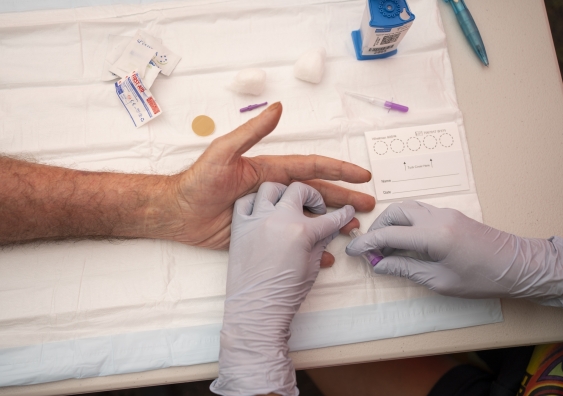Game-changing hepatitis C testing program awarded $6.5m
A program jointly run by the Kirby Institute at UNSW Sydney will set Australia on a path to eliminate hepatitis C.
A program jointly run by the Kirby Institute at UNSW Sydney will set Australia on a path to eliminate hepatitis C.

The federal Department of Health has awarded $6.5 million to the Kirby Institute at UNSW Sydney and the International Centre for Point-of-Care Testing at Flinders University to establish a national program to scale up hepatitis C point-of-care testing.
The program will establish testing with a ‘point-of-care’ test that can confirm active infection within 60 minutes for people who have traditionally had to wait up to a week for a test result. A point-of-care test is a diagnostic test offered on-site at a clinic or treatment facility, has a fast turnaround time and may lead to the initiation of treatment.
Australia could be one of the first countries in the world to eliminate hepatitis C, however increasing testing and treatment uptake will be essential to achieve the goal set by the World Health Organization (WHO) to eliminate hepatitis C infection as a major global public health threat by 2030.
“One of the major barriers for increasing hepatitis C testing and treatment in Australia is that several visits to a healthcare provider are required with multiple different tests to confirm active infection,” Professor Jason Grebely, who will be leading the program at the Kirby Institute, said.
“Fortunately, we now have access to technology that can test for active hepatitis C infection by taking a small amount of blood from a fingertip. This blood can then be analysed on site, with a result ready for the patient within an hour. If the result comes back positive, we can start treatment during that same visit.”
Hepatitis C has been declining in Australia since the country implemented wide access to direct-acting antiviral treatments. These treatments cure the virus in 95 per cent of people. But many people living with hepatitis C aren’t aware that they have it, so innovative methods are necessary to increase testing.
“Over the past two years, we have seen hepatitis C testing and treatment decline, however with concerted effort and additional investment Australia can get back on track to achieve its National Hepatitis C Strategy 2022 targets,” Carrie Fowlie, CEO of Hepatitis Australia, said.
The new program will see the rollout of these tests across Australia and will evaluate the impact of the program. The Kirby Institute is a world leader in hepatitis C research and has conducted evaluations of hepatitis C point-of-care tests and innovations since 2015.
In Australia, the key populations affected by hepatitis C are people who inject drugs and people in prison. The researchers will work in close partnership with a range of services to implement the program including drug treatment clinics, needle and syringe programs, community health centres, prisons, and peer and hepatitis organisations.
Ms Fowlie said these partnerships are crucial to the success of this program.
“With point-of-care testing, we’re essentially bringing the lab to the places where people who are at-risk already are. These services know their communities well, and so know best how to integrate the testing program into existing processes.”
The program will include the development of an operator training program and external quality assurance program which will be led by the International Centre for Point-of-Care Testing at Flinders University.
“This program will ensure high-quality testing and patient care across all sites,” said Professor Mark Shepard, Director of the International Centre for Point-of-Care Testing.
“Being able to provide the testing and treatment all in one visit is a real game-changer. We applaud the Australian government for investing in this program, and we look forward to working with our partners to implement it over two years.”